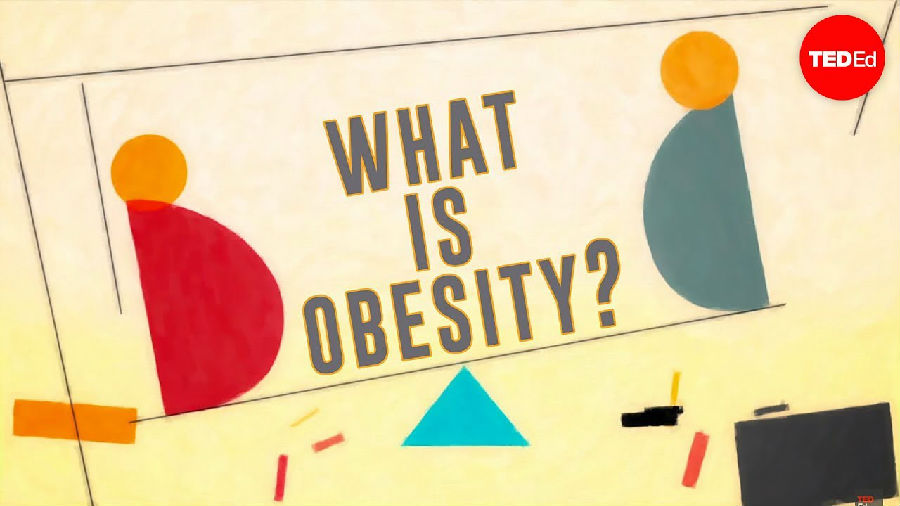(单词翻译:单击)
The most basic function of bodily fat is self-storage of food reserves.
食物储备的自我存储是脂肪最基本的功能。
In prehistoric times, natural selection favored genotypes that could endure harsh conditions by stocking the most fat.
在史前时期,以保存大量的脂肪来忍耐恶劣坏境的基因型在自然选择中胜出。
With chronic malnutrition being the norm for most of human history, genetics evolved to favor fat storage.
同时,因为慢性的营养不良普遍存在于大多数的人类历史中,遗传基因朝着脂肪存储方向进化。
So when did body fat become problematic?
那么,身体脂肪什么时候开始成为了问题?
The negative impacts of being overweight were not even noted in medical literature until as late as the 18th century.
超重的消极影响直到18世纪才在医学记载中出现。
Then, technological advances coupled with public health measures
接着,科技进步与公共健康措施
resulted in the betterment of the quantity, quality, and variety of food.
一起提升了食物的产量、质量和丰富性。
Sustained abundance of good food enabled a healthier population to boom economically.
源源不绝的良好食物使得健康人口的数目大增。
Output increased, and with it, leisure time and waistlines.
随着产量的增加,人们的业余时间和腰围也随之增加。
By the mid 19th century, being excessively overweight, or obese, was recognized as a cause of ill health,
到19世纪中期,极度超重或肥胖被认为是不健康的,
and another century later, declared deadly.
而一个世纪以后,肥胖则被宣告是致命的。
What is the distinction between being overweight and being obese?
超重和肥胖之间的区别是什么?
A calculation called the BMI breaks it down for us.
BMI公式为我们解释了这个问题。
For example, if someone weighs 65 kilgorams and is 1.5 meters tall, they have a BMI of about 29.
举例来说,如果一个人体重65千克,身高1.5米,其BMI值大约是29。
Obesity is a condition of excess body fat that occurs when a person's BMI is above 30,
肥胖意味着身体脂肪超标,即BMI超过30;
just over the overweight range of 25 to 29.9.
BMI在25-29.9之间则是刚刚超重。
While BMI can be a helpful estimate of healthy weight,
虽然BMI对估算健康的体重有一定帮助,
actual body fat percentage can only really be determined by also considering information like waist circumference and muscle mass.
但身体实际的脂肪百分比只能由腰围和肌肉群等信息决定。
Athletes, for instance, have a naturally higher BMI.
就像运动员天生就拥有较高的BMI。
So how does a person become obese?
那么,一个人是如何肥胖起来的?
At its most basic, obesity is caused by energy imbalance.
从根本上来说,肥胖是由能量的不均衡导致的。
If the energy input from calories is greater than the energy output from physical activity,
如果来自卡路里的能量输入高于物理运动所输出的能量,
the body stores the extra calories as fat.
身体存储的多余卡路里就成了脂肪。
In most cases, this imbalance comes from a combination of circumstances and choices.
大多数情况下,这种不平衡来自环境和选择的结合。

Adults should be getting at least 2.5 hours of exercise each week, and children a whole hour per day.
成年人每个星期至少要拥有2.5小时的运动量,而儿童每天应有1个小时的运动时间。
But globally, one in four adults and eight out of ten adolescents aren't active enough.
但是全世界有四分之一的成年人和五分之四的青少年并不积极运动。
Calorie-dense processed foods and growing portion sizes coupled with pervasive marketing lead to passive overeating.
高热量的加工食品、不断增加的食物分量和多样的食物市场共同导致了消极的过度饮食。
And scarce resources, and a lack of access to healthy, affordable foods creates an even greater risk in disadvantaged communities.
而在贫困的社区,食物资源和得到健康又不太昂贵的食物的途径有限,大大提升了出现问题的风险。
Yet, our genetic makeup also plays a part.
还有,我们基因组成也有一定作用。
Studies on families and on separated twins have shown a clear causal hereditary relationship to weight gain.
研究成长在不同家庭的双胞胎明确显示遗传和体重增加的关系。
Recent studies have also found a link between obesity and variations in the bacteria species that live in our digestive systems.
最近的研究也找到了肥胖和我们消化系统中细菌种类变化的联系。
No matter the cause, obesity is an escalating global epidemic.
无论何种原因,肥胖是一种逐步升级的全球性流行病。
It substantially raises the probability of diseases,
它更极大地提高了患上其他疾病的可能性,
like diabetes, heart disease, stroke, high blood pressure, and cancer.
如糖尿病、心脏病、中风、高血压和癌症。
It affects virtually all ages, genders, and socioeconomic groups in both developed and developing countries.
它无形中影响了所有年龄、性别和社会阶层的人群,无论是在发达国家还是发展中国家。
With a 60% rise in child obesity globally over just two decades, the problem is too significant to ignore.
在刚过去的二十年中,全球儿童的肥胖率提高了60%,肥胖问题已经足够严重且难以忽视。
Once a person is obese, the climb to recovery becomes progressively steeper.
一旦肥胖起来,想要恢复就会非常的艰难。
Hormonal and metabolic changes reduce the body's response to overeating.
荷尔蒙的和新陈代谢的变化减少了身体对过度饮食的反应。
After losing weight, a formerly overweight person burns less calories doing the same exercises as a person who is naturally the same weight,
在减去体重以后,一个原先肥胖的人,与原来就同样体重的人做同样的运动,会燃烧更少的脂肪,
making it much more difficult to shed the excess fat.
这也就使减去多余的脂肪变得更加困难。
And as people gain weight,
当人们体重增加时,
damage to signaling pathways makes it increasingly difficult for the brain to measure food intake and fat storage.
大脑信号通路受到的伤害让大脑对食物摄入的测量和脂肪存储的判断难度上升。
There is, however, some evidence that well-monitored, long-term changes in behavior
但是,一些证据显示,行为上良好的控制和长期的改变
can lead to improvements in obesity-related health issues.
能够帮助解决与肥胖相关的健康问题。
And weight loss from sustained lifestyle changes, or invasive treatments like bariatric surgery,
而且坚持减肥的生活方式,或者如减重手术之类的治疗,
can improve insulin resistance and decrease inflammation.
能够提高胰岛素抵抗力,并减少炎症的发生。
What was once an advantage for survival is now working against us.
一个曾经的生存优势正在与我们对抗。
As the world's population continues to slow down and get bigger,
随着世界人口的脚步持续放缓,块头越来越大,
moving and consciously eating our way towards a healthier weight is essential to our overall well-being.
活动和合理的进食是通往健康体重的方式,对我们的整体福祉至关重要。
And with the epidemic affecting every country in the world for different socioeconomic reasons,
这种流行病正影响着全世界的每个国家。出于不同的社会经济原因,
obesity cannot be seen as an isolated issue.
肥胖不应该被当成一个孤立的问题。
More global measures for prevention are essential to manage the weight of the world.
更多全球性的保护措施对于管理世界人民的体重十分关键。


